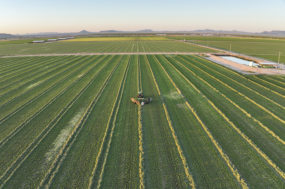The tentative contract must still be approved by the International Longshore and Warehouse Union’s membership of 13,000. The new contract is a five-year agreement that may end the rancor and contention that highlighted negotiations of late December. The previous contract had expired July 1, 2014.
During contract negotiations, the Agriculture Transportation Coalition reported ports along the West Coast handled less than 50 percent of normal volumes. The U.S. Forage Export Council reported losing $266,000 in hay and forage exports per day.
In December, John Szczepanski, director of the U.S. Forage Export Council, reported at the California Alfalfa, Forage and Grains Symposium in Long Beach that the backlog of containers ready to be shipped would be impacted for many months even after dockworkers resumed full schedules. Szczepanski said the foreign hay market was crippled enough that current contracts could suffer long-term damage as importing countries would look elsewhere to fill hay needs.
The Senate Subcommittee on Surface Transportation chairwoman, Deb Fischer (R-Neb.), called a hearing on Feb. 10, 2014, to focus on the labor dispute and related showdown.
One of the major points of contention in the negotiations had regarded healthcare benefits. While dockworkers enjoy complete healthcare coverage, the cost of that benefit has been rising, and employers wanted to renegotiate coverage. Other issues under negotiation included future automation at ports that would erode union membership. Union membership also wanted to replace the current dispute arbitrator by changing the arbitration system.
In a joint written statement, the Pacific Maritime Association president, James McKenna, and the union president, Bob McEllrath, said, “We are pleased to have reached an agreement that is good for workers and for the industry. We are also pleased that our ports can now resume full operations.”
The remaining question that will be determined over the next several months will be whether the conflict permanently affected decisions by those using the port to move business to the East Coast, Gulf Coast or Panama Canal ports, and whether export contracts were lost to other non-U.S. suppliers. FG
—Summarized by Progressive Forage Grower staff from cited sources










